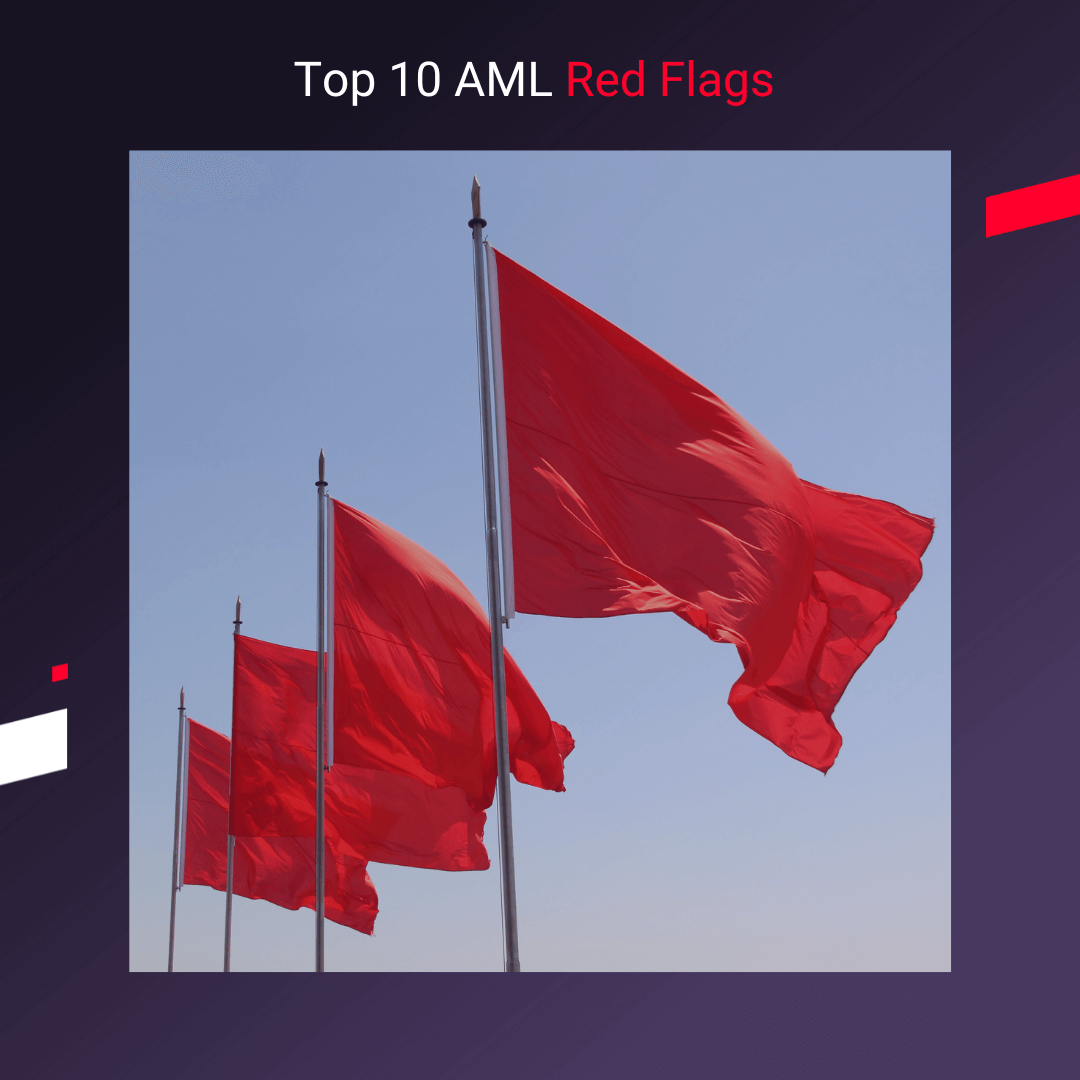What are red flags for AML risk?
Due to the varied nature of money laundering schemes and techniques employed by criminals there are many different red flags for AML risk. Some of the most common are an undue levels of secrecy, unusually large transactions, transactions involving high risk countries, and dealing with a third party.
Money launderers are constantly trying to exploit companies in the regulated sector to inadvertently help them wash their illicit funds. To achieve this they will utilise many different techniques and schemes, which can make them very difficult to identify.
Under UK AML legislation the responsibility to detect these attempts at laundering money is placed on the private sector. Fortunately, there are tools, such as Red Flag Alert, which help regulated companies confirm their customers identities and vet them against international money laundering and organised crime databases.
However, businesses in the regulated sector are still expected to give their staff the training they need to recognise red flags and if something seems amiss. Not only is this because the risk based approach laid out in our legislation requires this to be effective but also because the intuition of a properly trained person can be one of the most effective weapons in detecting money laundering activity.
But what are some of the things that you and your staff members should be looking out for? In this article we will look at some of the AML risk red flags you need to watch out for.
Improve your AML processes today
Request a trialMultiple small transactions
A common tactic that criminals will often employ is to try to avoid detection by splitting their dirty money into smaller transactions that are below the reporting threshold, which is usually €10,000.
The hope is that by doing so they do not trigger a company’s AML check processes and also avoid catching the attention of the authorities.
If you have a customer that is regularly requesting transactions that are close to the threshold you should consider this suspicious and run them through your AML and enhanced due diligence (EDD) processes.
Remember that just because there is a threshold transaction value when you must run AML processes doesn’t mean that you are legally unable to for any transaction of a lesser value.
The client or transaction is out of keeping with what is usual to your business
Money launderers are constantly on the hunt for new businesses to exploit, especially ones without robust AML processes.
If you are approached by a potential customer you must always consider whether they fit your usual customer profile, whether the transaction is similar to those you usually carry out, and how they have found your business.
For example, if you only deal with and advertise to companies in a defined geographic area why would a company from the other side of the country want to use your company and how did they hear about you?
Similarly, if the usual transaction amount for your company is in the four or five figures but a customer/prospect approaches you requesting a £500,000 transaction you would need to confirm the legitimacy of this transaction.
Dealing with a third party/agent
Often the owners of illicit funds will try to distance themselves from a scheme by acting through a third party or will hire a professional money launderer to wash their funds for them.
Not dealing with the owner of the funds is always a red flag and you should always confirm who the beneficial owner of the funds actually is.
Of course, legitimately acting via an agent is relatively common and perfectly legal but you always need to establish that this is the case. Any legitimate and reputable agent will be used to and expecting to undergo some form of AML processes whilst acting on their clients’ behalf.
An added advantage to doing this is it protects you against dealing with an agent who ha not carried out a robust AML process and that is acting in good faith but is actually being exploited by a financial criminal.
The transaction seems to be out of keeping with the company trying to make it
Money launderers will usually create shell companies to use in their schemes; which is quick and easy to do in the UK. This can range from anything in between single companies to vast and complex group structures. Whatever this looks like they have the unifying factor of not being legitimate businesses and will not perform a legitimate economic function.
Part of a robust AML process will also include KYB checks on any organisation that you deal with. Ask yourself questions such does this company seem like it actually trades, is the value of the transaction in keeping with the size of the company, how many employees do they have, who owns this company, do they and their employees have a social media presence.
If the company is part of a group you should also consider what the group does, if the other companies in the group appear legitimate, and if the company you are dealing with actually seem in keeping with being part of a large corporate.
Is a high risk country linked to the transaction
Whilst any international transaction presents potential risks, especially if your company usually only operates domestically, there are numerous countries that are innately higher risks than others.
This can be for several reasons but the most frequent are AML and banking regulations that fall below the international standard, known corrupt regimes, and countries that have high instances of organised crime and/or terrorism.
The UK government maintains a list of high risk countries. Any transaction with a client from or linked to any of these countries or if the funds are moving to or have passed through any of these countries then your most stringent AML and EDD processes need to be employed.
There is undue secrecy and/or resistance on behalf of your client
At this point in time, AML processes and checks are a usual part of doing business and clients should expect to undergo them. If your client tries to avoid undergoing your processes then this should be considered a major red flag.
Clients should also be used to being forthcoming with information about their companies and the purpose of their transactions. Any attempt to withhold information, unnecessary reticence or delay in supplying you with said information, or general attempts to obfuscate their business or dealings is one of the biggest red flags you will come across in AML risk.
Let Red Flag Alert reduce your AML risk
When following your AML processes it is important to remember to trust your instincts and be safe rather than sorry. Do not be afraid to be thorough or to ask your clients for further information or to undergo further checks if you feel they are necessary.
Legitimate clients will be used to undergoing AML and will be happy to help.
With Red Flag Alert, having a robust process in place does not need to slow down your business and your do not need to sacrifice accuracy for speed.
Our fully digital platform allows you to send out fully compliant AML and EDD checks in seconds. Our checks are AI powered, completed directly on your customers device in 60 seconds, delivered in your full branding, and multibureau analysis.
Not only this but our fully digital platform allows you to easily track your checks, automatically records your audit trail, and grants you access to complete business reports on all UK and 350 million+ international businesses.
To speak to one of our experts about your AML risk request a trial today and improve your processes.
Speak to an expert today
Get a free trial of the platform for 7 days




